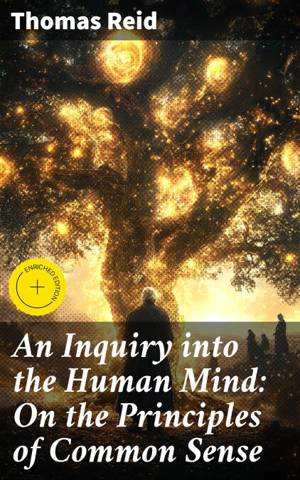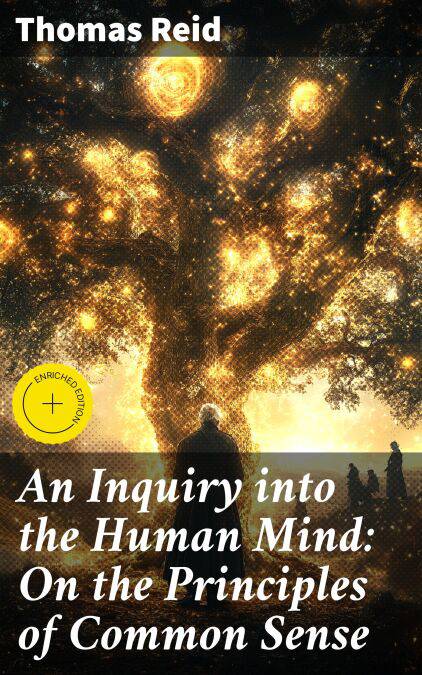
- Afhalen na 1 uur in een winkel met voorraad
- Gratis thuislevering in België vanaf € 30
- Ruim aanbod met 7 miljoen producten
- Afhalen na 1 uur in een winkel met voorraad
- Gratis thuislevering in België vanaf € 30
- Ruim aanbod met 7 miljoen producten
Zoeken
An Inquiry into the Human Mind: On the Principles of Common Sense E-BOOK
Enriched edition. Exploring the Foundations of Human Perception and Common Sense Philosophy
Thomas Reid
E-book | Engels
€ 1,99
+ 1 punten
Uitvoering
Omschrijving
In "An Inquiry into the Human Mind: On the Principles of Common Sense," Thomas Reid presents a foundational critique of sensationalism, advocating for a philosophy rooted in common sense. Through a clear, accessible prose style, Reid articulates his thesis that human perception and experience are inherently reliable guides to knowledge. Engaging with contemporary philosophical debates, particularly against the backdrop of the Enlightenment, Reid deftly responds to the skepticism of his predecessors while establishing an empirical framework based on intuitive understanding, thus shaping the foundations of Scottish philosophy. Thomas Reid (1710-1796), a central figure in the Scottish Enlightenment, developed his philosophical inquiries partly as a reaction to the emerging empiricist schools exemplified by Hume and Locke. His commitment to common sense and human faculties stemmed from his belief in the innate ability of individuals to discern truth without the convolutions of abstract reasoning. Reid's academic background in theology and natural philosophy further informed his exploration of human cognition and morality, seeking to bridge the gap between scientific inquiry and philosophical thought. This book is a must-read for anyone interested in the evolution of modern philosophy, particularly those exploring the intersections between perception, cognition, and ethics. Reid's arguments not only contribute significantly to epistemology but also challenge readers to reflect on their intuitive understanding of the world, making it an invaluable resource for both scholars and casual readers alike.
In this enriched edition, we have carefully created added value for your reading experience:
- A succinct Introduction situates the work's timeless appeal and themes.
- The Synopsis outlines the central plot, highlighting key developments without spoiling critical twists.
- A detailed Historical Context immerses you in the era's events and influences that shaped the writing.
- A thorough Analysis dissects symbols, motifs, and character arcs to unearth underlying meanings.
- Reflection questions prompt you to engage personally with the work's messages, connecting them to modern life.
- Hand‐picked Memorable Quotes shine a spotlight on moments of literary brilliance.
- Interactive footnotes clarify unusual references, historical allusions, and archaic phrases for an effortless, more informed read.
In this enriched edition, we have carefully created added value for your reading experience:
- A succinct Introduction situates the work's timeless appeal and themes.
- The Synopsis outlines the central plot, highlighting key developments without spoiling critical twists.
- A detailed Historical Context immerses you in the era's events and influences that shaped the writing.
- A thorough Analysis dissects symbols, motifs, and character arcs to unearth underlying meanings.
- Reflection questions prompt you to engage personally with the work's messages, connecting them to modern life.
- Hand‐picked Memorable Quotes shine a spotlight on moments of literary brilliance.
- Interactive footnotes clarify unusual references, historical allusions, and archaic phrases for an effortless, more informed read.
Specificaties
Betrokkenen
- Auteur(s):
- Uitgeverij:
Inhoud
- Aantal bladzijden:
- 236
- Taal:
- Engels
Eigenschappen
- Productcode (EAN):
- 4064066316310
- Verschijningsdatum:
- 10/04/2021
- Uitvoering:
- E-book
- Beveiligd met:
- Digital watermarking
- Formaat:
- ePub

Alleen bij Standaard Boekhandel
+ 1 punten op je klantenkaart van Standaard Boekhandel
Beoordelingen
We publiceren alleen reviews die voldoen aan de voorwaarden voor reviews. Bekijk onze voorwaarden voor reviews.







